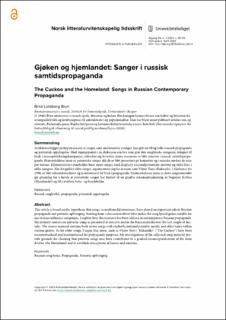| dc.description.abstract | Artikkelen bygger på hypotesen om at sanger, som multimodale ytringer, har spilt en viktig rolle i russisk propaganda og patriotisk oppdragelse. Med utgangspunkt i en diskusjon om hva som gjør den sanglyriske sjangeren velegnet til bruk i massepåvirkningskampanjer, utforsker jeg hvordan denne ressursen er blitt utnyttet i russisk samtidspropaganda. Primærkildene mine er patriotiske sanger slik de er blitt presentert på konserter og i russiske medier de siste par tiårene. Kildematerialet inneholder både nyere sanger med eksplisitt nasjonalpatriotiske motiver og eldre låter i ulike sjangere. Når det gjelder eldre sanger, argumenterer jeg for at noen, som Viktor Tsojs «Kukusjka» («Gjøken») fra 1990, er blitt rekontekstualisert og resemiotisert for bruk i propaganda. Undersøkelsene mine av dette sangmaterialet gir grunnlag for å hevde at patriotiske sanger har bidratt til en gradvis rekonseptualisering av begrepet Ródina (Hjemlandet) og til å etablere helte- og fiendebilder. Nøkkelord Russisk sanglyrikk, propaganda, patriotisk oppdragelse Abstract This article is based on the hypothesis that songs, as multimodal utterances, have played an important role in Russian propaganda and patriotic upbringing. Starting from a discussion about what makes the song lyrical genre suitable for use in mass influence campaigns, I explore how this resource has been utilised in contemporary Russian propaganda. My primary sources are patriotic songs as presented at concerts and in the Russian media over the last couple of decades. The source material contains both newer songs with explicitly national patriotic motifs, and older tunes within various genres. As for older songs, I argue that some, such as Viktor Tsoi’s “Kukushka” (“The Cuckoo”) have been recontextualised and resemiotisised for propaganda purposes. My investigations of the collected song material provide grounds for claiming that patriotic songs may have contributed to a gradual reconceptualisation of the term Ródina (the Homeland) and to establish conceptions of heroes and enemies. Keywords Russian song lyrics, Propaganda, Patriotic upbringing | en_US |

